The Electronic Intifada 4 June 2009
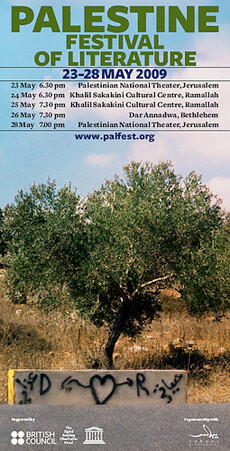
The flier for the second annual PalFest.
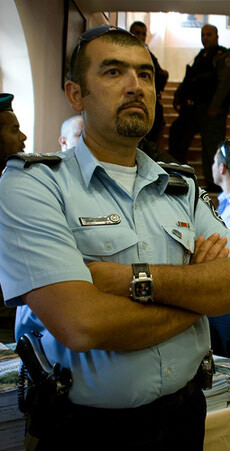
One of the Israeli police officers who shut down PalFest’s opening night in Jerusalem.
For many Palestinians, the month of May is associated with the commemoration of the Nakba. But with the increasing popularity of the arts in Palestine, the second annual Palestine Festival of Literature (PalFest) harmoniously unfolded to the final days of spring, a time also for lavender and lilies.
Ahdaf Soueif, an Egyptian-born novelist, along with Brigid Keenan, a travel writer, and Victoria Brittain, a former editor of the Guardian, came up with the idea of having a world-class literature festival in Palestine. “Last year we brought a festival to Palestine, and Palestine taught us so much in return. Palestinian cities — even under siege and a cruel military occupation — manage to produce brilliant art and top class education. PalFest aims to contribute to that rich cultural life,” Soueif said.
Of the festival’s 21 featured writers were Michael Palin, a travel writer and actor from the Monty Python series; Suheir Hammad, a Palestinian poet and actress from Brooklyn; Suad Amiry, a Palestinian architect and memoirist; and Henning Mankell, an international best-selling crime novelist and playwright, among many more.
“We chose people who wanted to know more about Palestine. This is a way for them to get in and see it, and hopefully, go home and write about it,” PalFest producer Omar Hamilton said.
The featured writers traveled throughout the West Bank to conduct workshops and discuss their literary work in panel discussions and seminars. In between, participants toured various refugee camps and centers in Jenin, Hebron, Bethlehem and Ramallah.
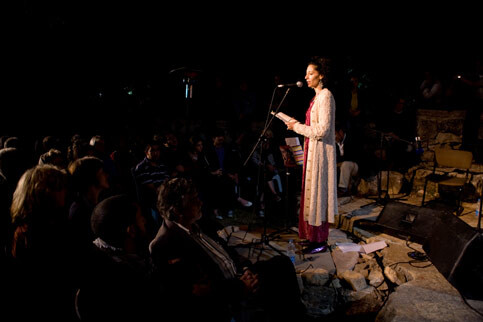
Poet Suheir Hammad performing at the Sakakini Center in Ramallah.
Because the writers were aware of Israel’s unjust treatment toward Palestinians, organizers agreed that to get a legitimate feel of Palestine they would travel as “Palestinians.” This meant the caravan of writers dealt with the cattle-trade of checkpoints, interrogations, and more.
“We wanted the writers to travel how Palestinians travel. We didn’t want them to have special treatment,” Hamilton said.
On a Saturday, at the courtyard of the Palestinian National Theatre in Jerusalem, the festival began like a huge family wedding. Piles of food and flowers stretched along a table. Writers greeted fans and weary travelers as stories of the previous day’s arduous border crossing, from Jordan to Jerusalem, were exchanged. The evening had been set to begin at 6:30pm and writers Carmen Callil, Henning Mankell and Claire Messud were to start the first panel titled, “Choosing Departure — a Different Perspective?”
But the law-making chimeras of Israel, it turns out, were not amused, and writers witnessed — on a scale unprecedented to what Palestinians face every day — Israel’s draconian measures.
Minutes prior to the festival’s start, armed Israeli police barricaded the National Theatre with a court order to shut the literature festival down. In badly written Arabic, the court order posted on the theater’s door declared the festival illegal, according to Article 3A of a 1994 Interim Agreement, which determines the Palestinian Authority (PA) cannot open or operate a representative mission in the area considered to be the State of Israel without written permission by Israel.
Despite the festival having no connection to the PA, the theater’s doors were locked and festival organizers, participants and attendees hastily relocated to a different venue where everyone helped set up chairs in the garden of the French Cultural Center.
“Today, we saw the clearest example of our mission: to confront the culture of power with the power of culture,” Ahdaf Soueif wrote on PalFest’s blog. The next day the festival went to Ramallah. In the garden of the Sakakani Center, a crowd of people, mostly internationals who work with non-governmental organizations in the West Bank, sat underneath the suspended arches of a fig tree.
First up was a panel titled, “Family: Separated by Life, Rejoined by Literature,” with writers Carmen Callil, founder of Virago Press; Jamal Mahjoub, author of Traveling with Djinns; and Jeremy Harding, a nonfiction writer and editor at The London Review of Books.
Harding is the author of Mother Country, a literary memoir on adoption and the need to belong. He talked to the crowd about his thoughts on family, or what he called an immense comic confusion. “What I wanted to do is write a comedy about the misunderstandings of adoption, the things that children, or I at any rate, failed to grasp when I was told I was adopted,” he said. The following panel featured two of the four Palestinian writers who were participants of the festival: Raja Shehadeh, who wrote the magnificent Palestinian Walks, and Suad Amiry, author of Sharon and my Mother-in-Law. Along with Michael Palin, they discussed the literary theme of changes in landscape and architecture. Each writer read an excerpt from their book.
Amiry, who said she became a writer by pure accident, delivered an elaborate, satirical tale from her forthcoming book, Murad Murad, a story of the humiliations of a Palestinian worker named Murad who dresses in the “garb” of an Israeli — spiky, gelled hair, outlandish sunglasses and cropped shorts — to find work in Israel.
She then spoke to the audience about the concept of time and space in a changing Palestine. “When [Palestinians] were under curfew for 42 days, it really felt like 42 years. I had my mother-in-law in my house and the Israelis in my garden, so I had two occupations: one inside and one outside,” she said.
The crowd laughed.
On day three of the six-day festival, the caravan of writers split up: some journeyed over to Jenin refugee camp where Michael Palin and Henning Mankell conducted a workshop with the young actors from the Freedom Theater, while others went to Birzeit University for a workshop with the university’s literature students.
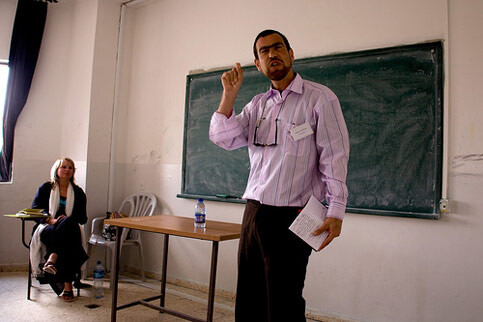
Writer Robin Yassin-Kassab leads a workshop with students from Hebron University.
Standing on the small stage of the theater, a mood of hilarity had set in as Palin spoke of his encounters as a travel writer: meeting new people in a new land, and relating it to how actors could benefit from humor to unsettle people. “The best way to create communication and break down barriers is by using humor. It’s about being able to laugh at ourselves and sometimes see our situation, wherever it is, as part of the general absurdity of the world we live in,” he said.
The young actors, all residents from the camp, enthusiastically performed a scene from a forthcoming play. Mankell and Palin then critiqued the play, offering basic advice.
Last up that evening was Suheir Hammad. Back at the Sakakini Center in Ramallah, a full crowd sat under clouds of cigarette smoke as Hammad recited poems about Gaza, her mother and Mahmoud Darwish. Dressed in a purple chiffon dress, curls wild as ever, the crowd listened with frozen smiles — some even wiping away tears — to her elegies of Gaza.
Day four, in Bethlehem, the caravan of writers passed the graffiti-covered apartheid wall beneath the watchtowers with pillbox windows, and drove into the besieged birthplace of Jesus.
After spending the day touring Azzeh camp, one of the smallest refugee camps in Palestine, and meeting with community leaders from Aida refugee camp, the busload of writers began the evening with a panel discussion titled, “Literary Representations of Migration and Travel.”
Writers Robin Yassin-Kassab, Claire Messud and Michael Palin chatted on stage with Jamal Mahjoub about their travel writings.
“We all have the complexity of departure and travel,” Messud said, referring to the essence of Britain’s past, its changing landscape, and relating it to contemporary life in the West Bank.
Palin held command of the discussion, however, looking directly at the audience while he spoke about his inspirations. “I grew up reading Hemingway’s adventure series … my imagination was greatly stimulated by stories of travel,” he said. The discussion, as all others, was in English, but headphones were available for those needing translation.
Sari Freitekh, a Palestinian who spent much of his time in the US, said, “I was kind of surprised that [the festival] was all in English. You would assume that as an event taking place in Palestine, part of it would be in Arabic. But the idea is coming here, and I think it’s good that they came.”
The next day the festival went to Hebron where the writers visited the Old City, a place now draped, literally, beneath a suspended fishnet positioned to prevent garbage strewn by Israeli settlers from above.
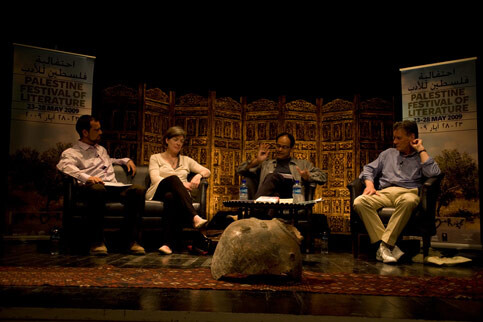
A panel of PalFest participants in Bethlehem.
Rumors telephoned around that Israeli officials would again shut down the festival on the closing night. In a symbolic act of defiance, however, everyone optimistically gathered at the Palestinian National Theatre.
But in a familiar and somewhat acquiescent tone that Thursday evening, the festival’s closing night began with a horde of people walking from the National Theatre to yet another venue designated at the last minute — this time, the British Council. Again, everyone rushed to set up chairs as Jerusalem, the supposed Arab Cultural Capital of 2009, was a temporary home to a literature festival twice shut down by Israel.
In yet another beautiful garden, some people stood, while others sat on the white plastic chairs spotted on the grass to hear the festival’s writers read inspirational words not of their own writing.
Jeremy Harding read an excerpt from a novel by S. Yizhar titled, Khirbet Khizeh, a book about the violent expulsion of Palestinian villagers by the Israeli army in 1948, while novelist M.G. Vassanji read an excerpt from Odyssey, when Homer comes back to Ithaca and finds it occupied. Palestinian poet Nathalie Handal said the words that inspired her most were the silent words of the land: the scent of jasmine, the words from Mahmoud Darwish’s spirt. “Silence has taken our voices,” she said.
After six days, a lesson was learned: Palestine is not just a place that will prevail from its proud resistance alone; it needs the popularity of art. Whether the literature festival, or the many film festivals and exhibitions around the world, art is a passionate way to affirm the commitment of the Palestinian motif.
“To use the words of Aime Cesaire,” Robin Yassin-Kassab said on the closing night, “There is room for everyone at the rendezvous of victory.”
All images by PalFest.
Sousan Hammad is a journalist based in the West Bank city of Ramallah. She can be reached at sousan D O T hammad A T gmail D O T com.




